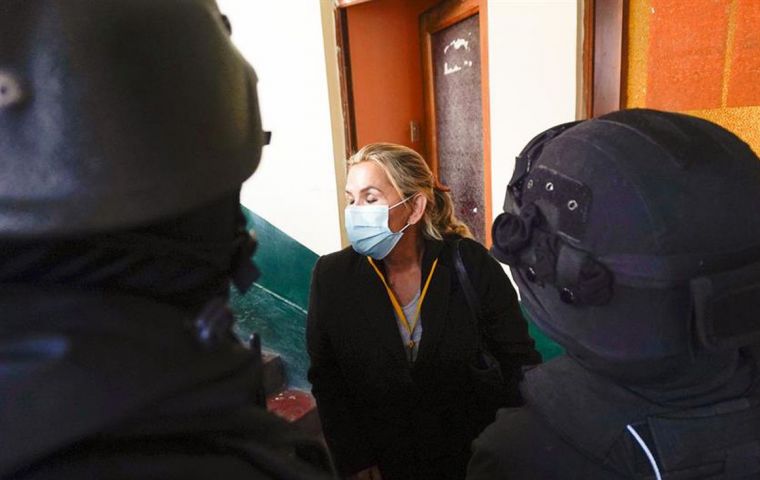MercoPress. South Atlantic News Agency
Arrest of former Bolivian interim president, escalates hostilities in the country
 Anez, ministers and security officials face charges of terrorism, sedition and conspiracy over an alleged coup against Bolivia's 13-year socialist government
Anez, ministers and security officials face charges of terrorism, sedition and conspiracy over an alleged coup against Bolivia's 13-year socialist government Bolivia's former interim President Jeanine Añez landed behind bars in La Paz after the new government arrested her on claims she participated in a 2019 coup to seize power. Supporters warned her arrest could lead to civil unrest in certain areas of Bolivia and argued there was no legality in the arrest and charges, but rather a political vendetta.
Añez and a raft of ministers and security officials face charges of terrorism, sedition and conspiracy over an alleged coup against Bolivia's 13-year socialist government, according to an arrest warrant she posted on social media.
Añez led Bolivia for less than a year after Bolivia's first indigenous long-time president Evo Morales left office following contested elections and violent protests.
The crackdown escalates hostilities between the current socialist administration of Morales' political ally and successor President Luis Arce, and more conservative opponents it accuses of ousting Morales.
Hours after a dawn raid on Añez's home in the central city of Trinidad, she was pictured behind bars in a women's holding cell in La Paz awaiting a judicial hearing due to take place within 24 hours.
She claimed to be the victim of “aberrant political persecution” and said she should benefit from immunity as a former president.
In letters to the Organization of American States and the European Union, Añez appealed for observer missions to evaluate her arrest and those of her former energy and justice ministers.
“It is an absolute outrage, they are accusing us of being accomplices of an alleged coup,” Añez told local television as she arrived in a military plane at a La Paz airport under heavy police escort.
“There is not a grain of truth in the accusations. It is simple political intimidation. There was no coup. I took part in a constitutional succession.”
Añez took power in late 2019 after Morales resigned amid widespread violent protests against his government over allegations he fraudulently won an election when running for an unprecedented and unconstitutional fourth term.
The Bolivian army and police forces refused Morales orders to quell, violently if needed, the protests.
At least 33 people were killed in violence that followed the election and after Morales fled the country and Añez took office. Añez and her conservative party agreed on the constitutional transition and a new election date with the majority of congress dominated by the party under the leadership of Morales
Morales' Movement for Socialism party, now headed by Arce, his former economy minister, swept back to power in a landslide election last October, prompting Morales to return from exile in Argentina.
Government Minister Eduardo del Castillo confirmed on Saturday that the Public Prosecutor's Office had detained Añez for involvement in a “coup in our country.” He insisted due process would be followed.
“There is no political persecution on our part here, and we do not fear anyone who thinks differently,” he told a news conference.
Justice Minister Ivan Lima told state TV the investigation against Añez related to the time she was an opposition senator, not the interim president. “For that reason constitutional privileges do not apply,” he said.
Julie Chung, the U.S. State Department's acting assistant secretary for its Bureau of Western Hemisphere Affairs, urged “our friends and neighbors in Bolivia” to uphold civil rights and guarantee detainees due process.
“Americans and many across the Americas know from hard experience the need to safeguard and constantly renew democratic rule of, by, and for the people,” she tweeted.
But the arrest and charges were not without criticisms. Luis Fernando Camacho, a lawyer and civic leader who became a powerful opposition figure and led protests against Morales in the 2019 election impasse, has also been named by prosecutors as wanted in relation to the alleged coup.
Any attempt to detain Camacho, recently elected as governor of the wealthy, industrial city of Santa Cruz to the east, could provoke civil unrest.
“We are not going anywhere. This is my town, I am going to stay with the people who were in that fight ... to peacefully defeat the electoral fraud of Morales and MAS,” he told reporters on Saturday evening.
Other opposition leaders who ran against Arce in the last election also spoke out against the arrests.
Carlos Mesa, a former president and candidate for the presidency in the 2019 election, told a press conference that Bolivia was flirting with Venezuelan-style autocracy. “This is not a legal problem, this is a political problem,” he said.
Añez's former Interior Minister Arturo Murillo, who was also named in the arrest warrant but is thought to have left Bolivia following Arce's election, tweeted “We Are All Jeanine.”
”(Añez) gave her all for Bolivia, including her freedom,“ he wrote.
Last week Argentine foreign minister Felipe Sola visited Bolivia for political and trade talks, during which he was awarded the country's highest honor for helping restore democracy to the Bolivian people. Solá also accused OAS Secretary General Luis Almagro of sponsoring the ”right wing coup“ that topped Morales with the support of the Trump administration.
”Almagro is an absolute immoral always at the orders of the strongest, at the orders of Donald Trump, betraying political history and mandates”, underlined publicly Solá




Top Comments
Disclaimer & comment rulesCommenting for this story is now closed.
If you have a Facebook account, become a fan and comment on our Facebook Page!